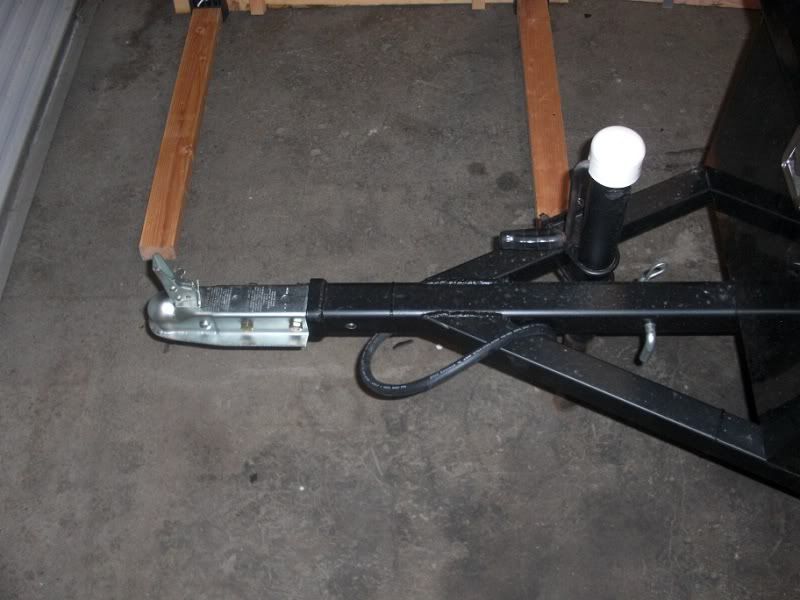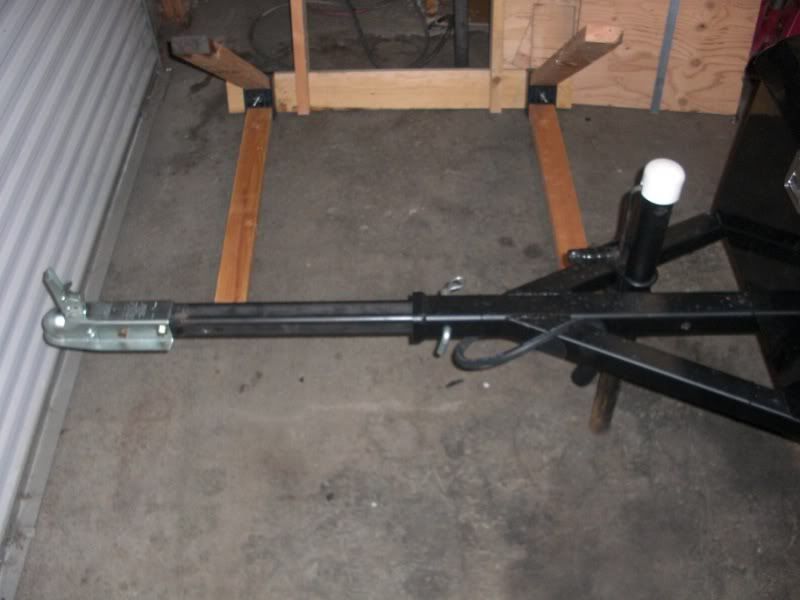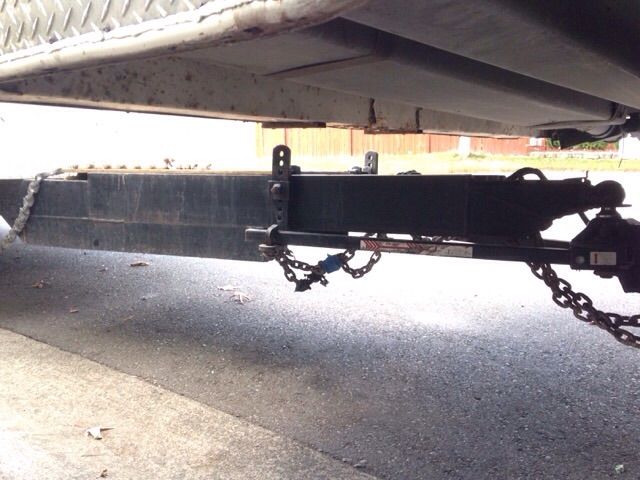- Good Sam Community
- Groups
- Travel Trailer Group
- Forum
- Re: Telescoping Trailer Tongue Extension Question
- Subscribe to RSS Feed
- Mark Topic as New
- Mark Topic as Read
- Float this Topic for Current User
- Bookmark
- Subscribe
- Mute
- Printer Friendly Page
Telescoping Trailer Tongue Extension Question
- Mark as New
- Bookmark
- Subscribe
- Mute
- Subscribe to RSS Feed
- Permalink
- Report Inappropriate Content
Jan-17-2017 03:56 PM
On my Bigfoot 10.6E Camper it does extend past the bed of the truck by ~3ft but it does not drop below the height of the bed. I think I should have plenty of clearance for when the truck and trailer are at extreme angles to each other. Most of my time I'll be on pavement anyway and about the most extreme angles I'll likely encounter are driveway entrances and speed bumps.
I think I would need about 3ft of telescoping tongue to fit my needs. Does anyone have any experience with such a setup?
I found an example of someone doing this type of work here:


1999 F350 Dually with 7.3 Diesel
2000 Bigfoot 10.6 Camper
- Labels:
-
Truck Campers
- Mark as New
- Bookmark
- Subscribe
- Mute
- Subscribe to RSS Feed
- Permalink
- Report Inappropriate Content
Jan-18-2017 11:48 AM
In my case, the Arctic Fox had the sewer dump on one side and generator exhaust on the other side. If I went through a driveway dip while turning sharply, an extended tongue would most likely contact one side or the other and cause damage.
I had no problems with a 28" extension on a short bed extended cab 3/4t pickup (one of the shortest wheelbases) while towing an 8000 lb 20' enclosed trailer. Although I used a weight distribution hitch for the 1000 lb tongue weight, I needed no anti-sway devices to comfortably travel the western half of the US.
Host Mammoth 11.5 on Ram 5500 HD
- Mark as New
- Bookmark
- Subscribe
- Mute
- Subscribe to RSS Feed
- Permalink
- Report Inappropriate Content
Jan-18-2017 10:46 AM
Bedlam wrote:
With all the work to pin the extension and chains, you might as well just add the SuperTruss to the back of the truck and leave your trailers stock. It seems you will be putting the same effort in configuring the trailer or truck, so why spend money on each trailer? I used to carry my SuperTruss behind the driver seat, but found it is easier to to put a marker/brake light into the end of the truss if I know I will be using it again the following day and just drive with it connected.
Fair enough question and that is essentially how I do things now. The system I have in mind requires just releasing tension on the chains and pulling the two pins. The extension would then slide back within itself and I put the pins back into the new position and re tension the chains. The primary benefit is that I don't have to pull off the extension and lug it around and try find a place to store it in the truck (can't leave it at the storage yard which is not located near my home so I can't just leave it at home either) or have it count against my weight budget when it isn't needed.
Leaving the SuperTruss on the truck to me just isn't appealing. My truck is 2wd and is not lifted so it doesn't sit that high off the ground. The hitch is always at risk of scraping on something and the occasional times I do go off a rutted dirt road it can cause all sorts of problems.
Another aspect I haven't thought about that others mentioned is the improved towing of the trailer because the longer tongue will make it more stable as well as improved handling of the truck because the tongue weight will be closer to the rear wheels. All good reasons I think.
1999 F350 Dually with 7.3 Diesel
2000 Bigfoot 10.6 Camper
- Mark as New
- Bookmark
- Subscribe
- Mute
- Subscribe to RSS Feed
- Permalink
- Report Inappropriate Content
Jan-18-2017 10:33 AM
Host Mammoth 11.5 on Ram 5500 HD
- Mark as New
- Bookmark
- Subscribe
- Mute
- Subscribe to RSS Feed
- Permalink
- Report Inappropriate Content
Jan-18-2017 10:11 AM
mkirsch wrote:
You guys missed one thing:
He wants a TELESCOPING tongue, not just an extended tongue.
I'm not sure such a thing is even legal. You'd have to check state laws on trailer construction.
For sure you'd need at least two ways to lock the tongue in position. It would be counterproductive to have a lone locking pin fall out or fail in a hard stop, sending the trailer into the rear of the camper.
For sure you'd want the slip fit to be TIGHT. You don't want it rattling around on you back there. Of course then a little bit of rust will cause the telescoping tubes to seize tight.
For sure you'd want the extension to be STOUT. Big beefy square tubing, but also be aware that with the stout come the pounds. It will definitely be heavier than a receiver extension, that's for sure.
You are correct that in addition to an extended tongue I want a telescoping tongue in order to configure the trailer for when I have the camper on or off or while it is in storage. If it wasn't for paying to store by the foot, I would likely just have a 3 foot extension permanently welded to the trailer.
As for legality, there are already swing away trailer tongues on the market to make it easier to store a boat or trailer in a shorted garage. Not certain where this might fit within that realm but it certainly seems like it's a pretty close extension of that concept.
Agreed on having multiple pins to keep the extension secured. I'm currently thinking of having at least two pull pins (with locks) as well as chains or cables under tension that will go from the tongue back to the trailer on the sides to give it some lateral tension and stability (much like the super truss has chains).
1999 F350 Dually with 7.3 Diesel
2000 Bigfoot 10.6 Camper
- Mark as New
- Bookmark
- Subscribe
- Mute
- Subscribe to RSS Feed
- Permalink
- Report Inappropriate Content
Jan-18-2017 09:10 AM
He wants a TELESCOPING tongue, not just an extended tongue.
I'm not sure such a thing is even legal. You'd have to check state laws on trailer construction.
For sure you'd need at least two ways to lock the tongue in position. It would be counterproductive to have a lone locking pin fall out or fail in a hard stop, sending the trailer into the rear of the camper.
For sure you'd want the slip fit to be TIGHT. You don't want it rattling around on you back there. Of course then a little bit of rust will cause the telescoping tubes to seize tight.
For sure you'd want the extension to be STOUT. Big beefy square tubing, but also be aware that with the stout come the pounds. It will definitely be heavier than a receiver extension, that's for sure.
Putting 10-ply tires on half ton trucks since aught-four.
- Mark as New
- Bookmark
- Subscribe
- Mute
- Subscribe to RSS Feed
- Permalink
- Report Inappropriate Content
Jan-17-2017 08:23 PM
Reality Check wrote:
Actually, it's a great idea. If done well. A few things come into play, first being you're actual tongue weight and the style of construction of the trailer.
I'm not to excited about the way it was done/type of trailer (square tubing) of the pictures you posted
I've done it, running one now that has a welded 18" extension. I have weighed lately shaving 24" off the truss and extending the tongue further. Would solve a couple of issues for me, but... haven't had the time as of late.
My double axle cargo trailer weight will be in the 1500lb to 3500lb weight and the travel trailer will be in 4000lb to 5500lb range.
These trailers will be used for my business so flexibility is valuable for me. I will be switching my trailer / truck combo enough to want to save the hassle of removing the super truss hitch and my rig is stored at a storage facility and so I cannot leave the extension behind so it takes up valuable space and weight. I also pay for the indoor storage by the linear foot so being able to remove 3ft from each trailer saves almost $42 a month or ~$500 a year.
The benefits to me are pretty obvious for my needs but the purpose of my question is to ask about the problems that might arise from such a setup (from those with experience with such a setup). I can see one of the primary problems would be the side to side sway that could result if the tongue extension is not sufficiently braced. I would likely handle that problem the same way the super truss handles it with chains pulling tension on the sides of the extension.
1999 F350 Dually with 7.3 Diesel
2000 Bigfoot 10.6 Camper
- Mark as New
- Bookmark
- Subscribe
- Mute
- Subscribe to RSS Feed
- Permalink
- Report Inappropriate Content
Jan-17-2017 07:55 PM
Anyone who thinks it can't be done strong and reliable enough needs to go look at a dump truck trailer - they use EXACTLY this idea! One large telescoping square tube... stretch it out long when loaded to meet weight-bridge laws, shorten it when empty to turn easier.
And those trailers weigh 50,000 pounds.
All the guys who say it will hit the camper haven't got one.
They're also forgetting that their long hitch extension can bottom out on dips too.
There's no way anyone can deny that moving the hitch ball back three or four feet isn't good for handling, stress, weight balance, and sway. It's pretty much all bad.
Keeping the hitch closer to the truck's rear axle is ideal.
Everyone suddenly agrees with me when they have their camper off... they all take the extensions off right away!
Yes I know, extended hitches work... but not as well.
Here's my setup, 10,000 pound trailer behind 11.5 camper. My stretched tongue is stronger than the original was.

99 Ram 4x4 Dually Cummins
A whole lot more fuel, a whole lot more boost.
4.10 gears, Gear Vendors overdrive, exhaust brake
Built auto, triple disc, billet shafts.
Kelderman Air Ride, Helwig sway bar.
- Mark as New
- Bookmark
- Subscribe
- Mute
- Subscribe to RSS Feed
- Permalink
- Report Inappropriate Content
Jan-17-2017 07:35 PM
hedge wrote:
The first dip you go through the trailer hitch will contact the camper, I'm in the extended truck hitch camp....
yea, not quite a true statement. I can't even imagine the steepness of the hill that would cause them to connect.. maybe in and out of a ditch.
Have both... both have their place.
- Mark as New
- Bookmark
- Subscribe
- Mute
- Subscribe to RSS Feed
- Permalink
- Report Inappropriate Content
Jan-17-2017 07:24 PM
hedge wrote:
The first dip you go through the trailer hitch will contact the camper, I'm in the extended truck hitch camp.
Besides, you extend the hitch once instead of extending each trailer you want to use.
Not!
One of the reasons I ended up with a Bigfoot is precisely what the OP stated - the camper extends back from the truck but it DOES NOT drop down at all - never drops below the level of the top of the truck bed. That would have to be one heck of a dip for the camper and trailer tongue to meet!
Instead of building an extension on my trailer tongue I had a custom trailer built with extended tongue and it works beautifully. I take the combo into some pretty rough country and have yet to have a problem with the extended tongue contacting the camper.
- Mark as New
- Bookmark
- Subscribe
- Mute
- Subscribe to RSS Feed
- Permalink
- Report Inappropriate Content
Jan-17-2017 07:09 PM
Assuming the trailers are light enough, my recommendation would be to use a combination on an 18" extension on the truck combined with an 18" extension on the trailer. This splits the extra strain between the two components while at the same reduces the problem with dips.
One thing to take into consideration is the turning radius before the camper impacts the trailer.
2004 Lance 815 (prev: 2004 FW 35'; 1994 TT 30'; Tents)
- Mark as New
- Bookmark
- Subscribe
- Mute
- Subscribe to RSS Feed
- Permalink
- Report Inappropriate Content
Jan-17-2017 06:30 PM
Besides, you extend the hitch once instead of extending each trailer you want to use.
2013 Adventurer 89RB
- Mark as New
- Bookmark
- Subscribe
- Mute
- Subscribe to RSS Feed
- Permalink
- Report Inappropriate Content
Jan-17-2017 04:56 PM
- Mark as New
- Bookmark
- Subscribe
- Mute
- Subscribe to RSS Feed
- Permalink
- Report Inappropriate Content
Jan-17-2017 04:46 PM
I'm not to excited about the way it was done/type of trailer (square tubing) of the pictures you posted
I've done it, running one now that has a welded 18" extension. I have weighed lately shaving 24" off the truss and extending the tongue further. Would solve a couple of issues for me, but... haven't had the time as of late.
- Mark as New
- Bookmark
- Subscribe
- Mute
- Subscribe to RSS Feed
- Permalink
- Report Inappropriate Content
Jan-17-2017 04:42 PM

34": 6000 lbs GTW/600 lbs TW, 24": 8000 lbs GTW/800 lbs TW
https://www.amazon.com/gp/product/B00537ESCQ/ref=oh_aui_detailpage_o00_s02?ie=UTF8&psc=1
- Mark as New
- Bookmark
- Subscribe
- Mute
- Subscribe to RSS Feed
- Permalink
- Report Inappropriate Content
Jan-17-2017 04:37 PM





